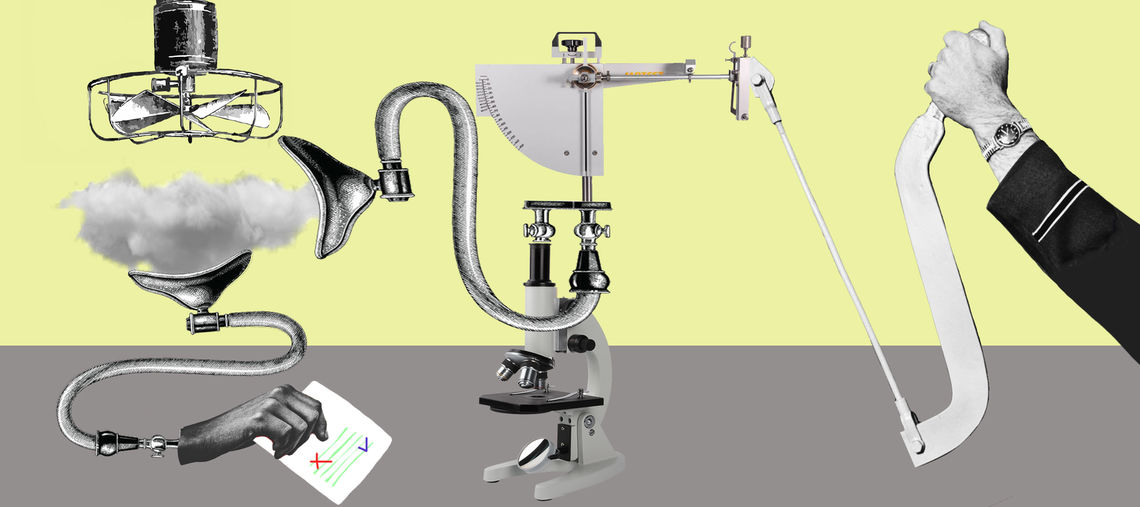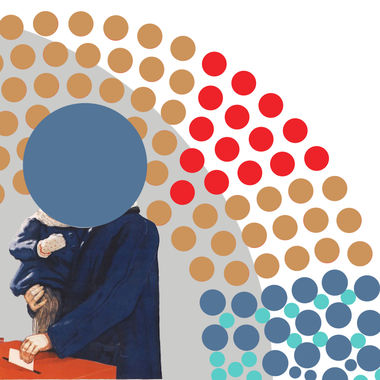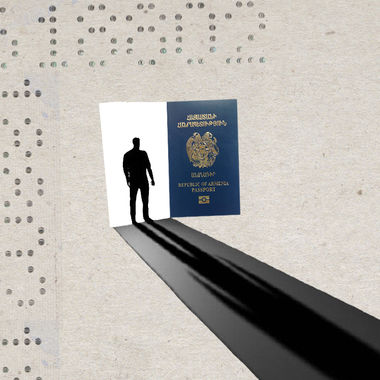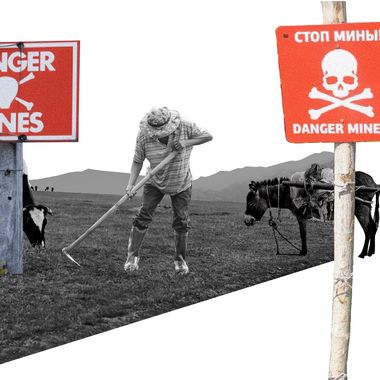Mon May 10 2021 · 13 min read
Election Finally Officially Triggered: Here Are the Possible Outcomes

By Harout Manougian

The early parliamentary election was finally officially triggered today, May 10, 2021. On April 25, 2021, Nikol Pashinyan had formally tendered his resignation as Prime Minister, although he announced that he would remain in the role in an acting capacity, and seek re-election through an early parliamentary election.
Edgar Ghazaryan, a former Chief of Staff at the Constitutional Court, grabbed some headlines when he argued that Pashinyan cannot remain acting Prime Minister after his formal resignation. However, fact-checking website fip.am pointed out that Article 158 of the Constitution specifically provides for members of the Government (i.e. the executive branch, including the Prime Minister and cabinet ministers) to “continue performing their duties until a new Government is formed.”
When the post of Prime Minister becomes vacant, due to a resignation, vote of no confidence or death, the National Assembly must hold up to two attempts at electing a new Prime Minister; only if both such attempts fail is an election triggered. The first such attempt took place on May 3, 2021. The Prosperous Armenia Party (PAP) did not attend the vote, while the Bright Armenia Party did not actively cast votes. The My Step Alliance nominated Nikol Pashinyan for the vote, but then abstained in order to allow the process leading to an election to continue. The final vote was zero votes in favor, two against and 78 abstentions. Babken Tunyan (My Step) and Arman Babajanyan (For the Republic Party) voted against. There was some confusion when My Step MP Narek Ghahramanyan voted in favor, but then corrected his vote to an abstention.
The second attempt took place on May 10, 2021. After several hours of speeches and questions, the expected results finally came through: 1 in favor, 1 against and 76 abstentions. Having failed to elect a Prime Minister after two attempts, the National Assembly is dissolved.
With the constitutional formalities now out of the way, it is up to President Armen Sarkissian to set the official election date, which must fall in the range between 30 and 45 days from May 10 (between June 9 and June 24). There is a custom of holding elections on Sundays (leaving June 13 and June 20) but this is not a legal requirement. Although Nikol Pashinyan announced on March 18, 2021, that he had come to an agreement with the two parliamentary opposition parties to hold an election on June 20, it is the President who gets to officially decide the date.
Recent Reforms to the Electoral Code
New amendments to the Electoral Code, Bill C-894, the result of a multi-year electoral reform process, passed second reading on Friday, May 7, 2021, but just barely. As a Constitutional Law, the Electoral Code requires a three-fifths supermajority of all MPs to amend. That is, at least 80 of the 132 MPs must cast an affirmative vote. The final bill passed with 81 votes in favor.
An earlier amendment, Bill P-919, had eliminated the open list component, known as ratingayin, where voters could choose a specific candidate running in their region. Now, candidates will only be elected in rank order, off their party’s closed list. The President had refused to sign this bill, but did not contest its constitutionality. When this happens, the Speaker of Parliament can sign the bill 21 days after it passed, which took place with Bill P-919, which will be in force for the coming early election.
As it was expected that the President would also refuse to sign Bill C-894, a similar 21-day delay could have been expected, which could end up being in the thick of the election campaign. In order for there not to be any rule changes mid-campaign, the provisions in Bill C-894 will not come into force until January 1, 2022, and will not apply to the early election. It included aspects for greater financial transparency, regulating campaign activities, lowering the threshold for political parties from 5% to 4%, etc.
The electoral threshold for political parties will remain 5% for this election, and 7% for electoral alliances of two or more parties. Parties that receive less votes do not receive any seats in Parliament.
With the open list component now gone, the next Parliament will have a greater proportion of female MPs as 1 in 3 candidates on parties’ rank-order candidate lists must now be a woman (up from 1 in 4). This provision had been written into the 2016 law but only came into effect on January 1, 2021.
The Players
Political parties and alliances will have until 25 days before election day (a May 26 deadline) to submit their registration paperwork. Most of the big names have already made their intentions publicly-known.
· Nikol Pashinyan’s Civil Contract Party will participate alone, dissolving its My Step Alliance with the much smaller Mission Party.
· Robert Kocharyan will lead the Armenia Electoral Alliance between the Armenian Revolutionary Federation (ARF) and the smaller Resurgent Armenia Party.
· Artur Vanetsyan will lead an electoral alliance between his Homeland Party and the Republican Party of Armenia.
· Gagik Tsarukyan’s Prosperous Armenia Party will participate alone.
· Edmon Marukyan’s Bright Armenia Party will participate alone.
There has been a flurry of new political party registrations in past months and some upstarts can also be expected to register. One or two may be successful in passing the threshold.
Former President Levon Ter-Petrosyan had reached out to Serzh Sargsyan and Robert Kocharyan to contest the election together under a “National Accord Alliance” banner, but was rebuffed. His Armenian National Congress (ANC) Party did not participate in the 2018 election. In 2017, they joined an electoral alliance with Stepan Demirchyan’s People’s Party of Armenia (PPA) but, with 1.7% of the vote, failed to meet the electoral threshold.
Note that a loophole exists where two parties could form an unofficial alliance but still only be subject to the 5% threshold for political parties. Up to 30% of a party’s candidates are permitted to be non-party members, even members of another political party. Thus, a dominant party could choose to take on a junior partner without actually registering as an electoral alliance, if the junior partner contributed only 30% or less of the candidates on the list. In such a scenario, only the dominant party’s name would appear on the ballot, however.
The official campaign period, during which campaign spending is more strictly regulated, begins 7 days after the registration deadline and ends two days before the election. The day immediately before the election is considered a Day of Silence, during which campaign activity is not permitted.
However, the campaign has long since been underway. Billboards and bus stops already sport the Resurgent Armenia and Civil Contract Party’s ads. This spending, before the official campaign period, is considered regular party operations, and will not be publicly reported until March 25, 2022, as part of the parties’ annual financial filing for 2021. Robert Kocharyan has used another loophole. His billboard ads are technically for his book, which is not considered political spending.
Another interesting development is the release of a new movie called Authority (Ishkhanutyun in Armenian) by well-known Armenian director Mher Mkrtchyan. The film follows a fictional female character who starts as an advisor to President Serzh Sargsyan and follows her life during the 2018 Velvet Revolution and through to the 2020 Artsakh War. The film, which premiered on April 16, 2021, casts Nikol Pashinyan in an extremely critical light. It parallels election-year films in the United States like Fahrenheit 9/11 in 2004 and Hillary: The Movie in 2008, which were clearly intended to influence election outcomes.
The Possible Outcomes
The real trigger for this early election came after Nikol Pashinyan made a comment in late February that Russian-supplied Iskander missiles “had not exploded, or exploded, for example, at 10%,” during the 2020 Artsakh War. This comment led to a harsh reaction from Moscow, which considered it an affront to the reputation of their military technology that is also sold to other countries, and a call from Armenia’s military brass for Pashinyan to resign. Pashinyan called the military’s announcement a “coup attempt” and encouraged his supporters to rally at Republic Square. After firing Onik Gasparyan, the Chief of the General Staff, Pashinyan came to an agreement with the parliamentary opposition parties to hold an early election on June 20, saying that only the people can remove him from office.
Pashinyan had previously proposed an early election through a December 25, 2020 Facebook post, but the Homeland Salvation Movement, which was leading protests calling for his resignation, rejected it, arguing that he must first hand over power to them, after which they would organize an election. That Facebook post repeated the message that he would leave the office of Prime Minister only through the decision of the people.
This early election is thus Pashinyan’s attempt to re-establish his legitimacy after the defeat in the 2020 Artsakh War. However, the goal markers for whether it accomplishes that or not have so far been left ambiguous. The following are the main possible scenarios for the outcome of the election, based off party rankings from recent poll results.
Scenario 1: Pashinyan wins over 50% of the vote
In 2018, Pashinyan’s My Step Alliance achieved a landslide victory, with 70% of the popular vote. In 2021, his results are expected to be much lower than that. If he can secure at least 50% of the votes cast, even if turnout goes down from the 1.26 million voters that showed up in 2018, he would have secured his position for the next five years.
Scenario 2: Civil Contract wins less than 50% of the votes cast but still gets a majority of the seats
Since the 2015 Constitution, Armenia has had a nominally proportional electoral system, where the proportion of votes is supposed to translate to the proportion of seats. However, in actuality, there are distortions from this proportionality principle embedded in the Electoral Code, written under Serzh Sargsyan’s administration under the leadership of former-Minister of Justice Davit Harutyunyan.
One such distortion is the minimum electoral threshold, which is common in many countries. Parties that receive less than 5% of the vote are ignored in the calculation for distributing MP seats, as if those voters never showed up at all. If there are many parties in this situation, a significant amount of the total vote can be wiped away. In 2018, 15% of votes cast went to parties that received zero seats. The high point was the 2007 election, when a whopping 25% of proportional votes went to parties that received zero proportional list seats (23 parties participated in that election).
Another distortion is the way the four ethnic minority bonus seats are distributed, which favors the largest parties as an add-on after the initial proportional distribution.
If Pashinyan’s Civil Contract Party takes less than 50% of the vote, it is still possible for them to receive a majority of the seats in Parliament. This scenario actually happened in 2017, when the Republican Party of Armenia received 49% of the votes but 55% of the seats.
Under such a circumstance, Pashinyan would be in a difficult position. He had resisted calls to resign by saying that only “the people” can remove him from power. If the majority of voters vote against him, however, and his party stays in power only due to the distortions from an Electoral Code that was meant to entrench Serzh Sargsyan’s hold on power, the election will not truly grant him the legitimacy that he sought. He may well refuse to resign, but protesters calling for his ouster could point to the election results as justification that he needs to leave office. It would be hypocritical of the protesters to make such a demand, however, as it was the Republican Party of Armenia and the Armenian Revolutionary Federation who passed the initial version of the current Electoral Code in 2016. (These two parties have been the main pillars of the Homeland Salvation Movement that has led anti-Pashinyan protests since November.) Prosperous Armenia also mostly supported the 2016 Electoral Code, though a few of its non-partisan MPs (who still sat with the Prosperous Armenia Caucus) did vote against it.
Ideally, under such an outcome, Pashinyan would agree to hand over power to a successor from the Civil Contract team, but the process for such an internal leadership race could jeopardize the unity of the team and lead to unforeseeable consequences.
The question should be put to Pashinyan as to what he would do under this scenario before it actually happens.
Scenario 3: No party wins a majority of seats, coalition government formed
If no party receives a majority of the seats after the June 20 election results, there is a brief period of time for the political parties to come to a coalition agreement. As the provisions in Bill C-894 will not yet be in force, such a governing coalition can consist of a maximum of three election participants (political parties or electoral alliances). Depending on how the math plays out, Pashinyan may be able to negotiate an agreement with the Bright Armenia party and/or perhaps a small upstart party but such a scenario is only likely if there is a chance that the Armenia Alliance and the Homeland-RPA alliance can form a governing coalition, perhaps with Prosperous Armenia. The possible arrangements will be dictated by the seat distributions.
The Bright Armenia Party could place a condition that they would only join a governing coalition with the Civil Contract Party if Nikol Pashinyan is not the Prime Minister. As Pashinyan himself would be the one who has to agree to the terms, he likely would not accept such a deal, unless a Kocharyan-led coalition is imminent.
Some European countries can hold coalition talks for months (or rarely over a year). Armenia has a deadline of six days.
Scenario 4: No party wins a majority, no coalition can be formed
If no party has a majority of the seats in the first round and no governing coalition can be formed within six days, a second round of the election is declared for 28 days after the first round (July 18, 2021). The very existence of the possibility of a second round is a major disincentive to forming a governing coalition.
No second round parliamentary election has been held in Armenia as, both in 2017 and 2018, the largest party has received a majority of the seats from the first round alone. Most Armenians don’t even know this provision exists or how it works.
In the second round, the top two parties/alliances face off against each other; they are the only two choices. They may form new alliances with the smaller parties but do not need to. Whichever side wins the second round receives as many bonus seats that will bring them up to a stable majority (currently defined as 54%). Other parties retain the seats they won from the first round results. If a new alliance is formed for the second round, the bonus seats are awarded proportionally according to the alliance members’ first round results.
In this scenario, it is most probable that the top two contenders would be Pashinyan’s Civil Contract and Kocharyan’s Armenia Alliance. If Pashinyan does win the second round election, he avoids the ambiguity of his public mandate that Scenario 2 and Scenario 3 create; he could point to a majority of the second round results to support his legitimacy to stay on as Prime Minister. It’s also possible that he does not win the second round.
Scenario 5: Kocharyan wins
The first four scenarios all take for granted that Pashinyan’s Civil Contract Party will receive the most votes, as has been suggested by polls. A closer look at those polls actually suggests that the momentum is against him, however. Armenia’s Gallup affiliate has released the results of several polls, conducted in February, March and April. While poll results have margins of error, and events like the 2016 U.S. presidential election show that respondents are not always completely honest, the trend has been decreasing support for Pashinyan and increasing support for Kocharyan. Pashinyan has come down from 33.1% in February, to 31.7% in March, to 27.2% in April. Kocharyan has risen from 5.6% in February, to 5.9% in March, to 8.1% in April. These percentages are for all respondents, not only decided voters; in all the polls, a sizable number of respondents answered “No one” or “I will not vote at all.”
One should not discount the possibility that Kocharyan’s Armenia Alliance wins the June 20 election, or a potential second round on July 18.
If that happens, Pashinyan might argue that the results should be invalidated and refuse to peacefully transfer power. Elections under Armenia’s first three presidents have been associated with fraudulent activity. Short of documented actual cases of ballot box stuffing, however, it would be a difficult case to make in 2021. The precincts will be manned by eight-person Precinct Electoral Commissions (PECs), two from each parliamentary faction (My Step, Prosperous Armenia and Bright Armenia) and two appointed by the Territorial Electoral Commissions (TECs), which are the middlemen between the Central Electoral Commission (CEC) and the local precincts. The expectation is that the PECs (which will not have any members from Kocharyan’s Armenia Alliance or the Republican Party of Armenia) should be able to prevent electoral violations from taking place on election day.
One common tactic to violate ballot secrecy is for a political party to pressure a voter into allowing a party representative to accompany them behind the voting booth. Surprisingly, this practice is completely legal if the voter says they need “assistance” for accessibility reasons. While the provision is supposedly meant for blind people, amputees or illiterate voters, in practice, it is used extensively for elderly voters with no visible disabilities; they do not need to explain the reason they are requesting assistance. It is believed that the practice allows parties to verify that a voter makes good on their promise after accepting a vote bribe. The provision has not been eliminated.
Pashinyan called this election under the expectation that he would win. If he ends up losing, even if only because his government did not close legal loopholes in time, he would still be at fault.
The election was billed as the path to bringing Armenia back to political stability. Unfortunately, not all the possible scenarios will accomplish that.
also read
A History of Armenian Political Party Splits and Alliances
By Harout Manougian
Harout Manougian presents a comprehensive overview of the different alliances and government coalitions in parliamentary elections since Armenia’s independence in 1991.
How Will Armenians With COVID-19 Vote on Election Day?
By Harout Manougian
Armenia has about 15,000 active COVID-19 cases. Even if that number decreases by June 20, there will most likely be thousands of eligible voters who are positive. With no mail-in voting and no opportunity to vote in advance, election administrators face a constitutional conundrum.
Direct Presidential Elections Undermine Stable Party Politics
By Harout Manougian , Fernando Casal Bértoa
Armenia’s President expressed his desire to re-introduce direct presidential elections to Armenia. Doing so could place a stumbling block in the way of Armenia’s democratic consolidation.
Should Armenian Dual Citizens Be Banned From Running For Office?
By Harout Manougian
Dual citizens cannot run in Armenian parliamentary elections, but that hasn’t always been the case.
New on EVN Report
Are We Ready for the Next Cyber War?
By Paruyr Abrahamyan
Armenia is at the wrong end of global cyber security indexes. The lack of a comprehensive cyber security national policy makes the country's network and information systems vulnerable. The 2020 Artsakh War clearly proved this.
Artsakh’s Cultural Heritage Under Threat
By Hovhannes Nazaretyan
Armenian cultural, religious and historical monuments and sites currently under Azerbaijani control in the aftermath of the 2020 Artsakh War are under immediate threat of vandalism and destruction.
Dealing With a New Wave of Land Mines
By Lusine Sargsyan
Following the First Karabakh War, landmines and explosive remnants of war became a major hazard for civilians. Today, four regions of Armenia are still contaminated with unexploded ordnance, impacting over 35,000 residents.
Military Expenditures and the Economy: Behind the War of Weapons
By Ani Avetisyan
Azerbaijan increased its military spending by 17% in 2020; this was among the largest annual increases in Eastern Europe and Eurasia. Ani Avetisyan breaks down the numbers of the military expenditures of both Armenia and Azerbaijan.
Are Armenia-EU Trade Relations Entering a New Stage?
By Suren Parsyan
COVID-19 and the 2020 Artsakh War impacted Armenia-EU trade and economic relations and not only. Moving forward, Armenia must balance opportunities and risks in two directions of integration - CEPA and as a member of the Eurasian Economic Union.
The Calamitous 1921 Treaty of Moscow
By Mikael Yalanuzyan
The Treaty of Moscow reaffirmed, almost identically, the borders laid out in the Treaty of Alexandropol. Armenia, thus, conceded 20,000 square kilometers to Turkey. Mikayel Yalanuzyan reveals the details of those turbulent times.
The Hunt for Spies
By Astghik Karapetyan
There have been numerous public accusations related to espionage and high treason since the start of the 2020 Artsakh War. Despite all the noise, only one case of high treason and one case of espionage were filed during and after the war.
Podcasts














